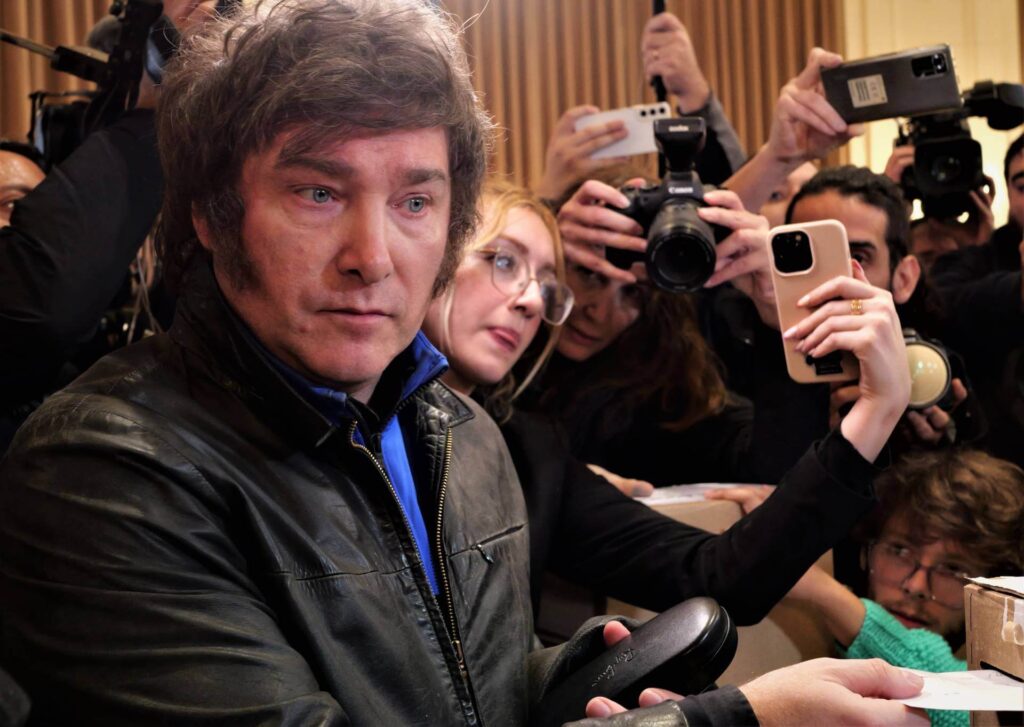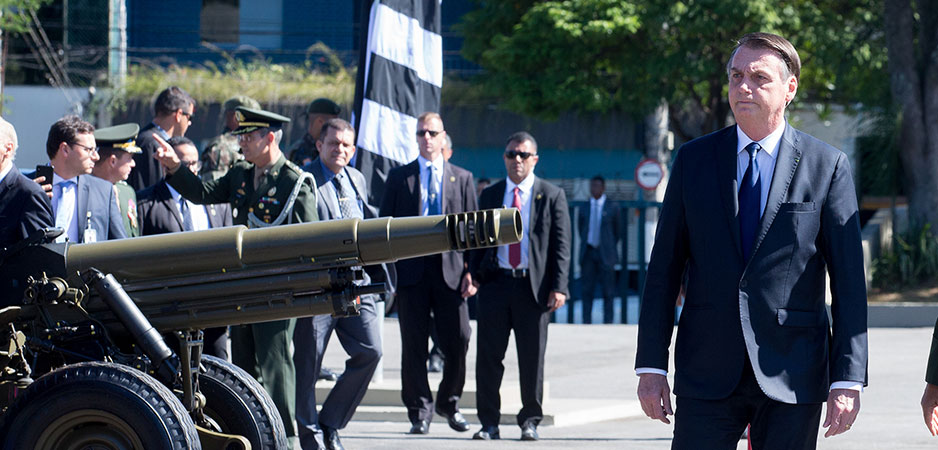On October 30, 2022, Brazilian President Jair Bolsonaro lost a hard-fought bid for reelection. His supporters rioted throughout December and gathered in camps outside army bases. On January 8, 2023, they staged an attempted coup d’état. The world watched, flabbergasted, as 9,000 rioters invaded the Three Powers Plaza, the heart of Brazil’s democracy in Brasília. They looted and vandalized buildings representing the three branches of government: Planalto Palace (seat of the presidency), the Senate and the Supreme Federal Court.
For the global audience, it looked like a hastily made copy of the invasion of the US Capitol on January 6, 2021. The visibly older, overwhelmingly white crowd sported the shirts of Brazil’s national football team. Watching older men behaving in a disorderly and dangerous manner in the largely empty city was surreal.
On the surface, the insurrection looked like a spontaneous movement that started a few months prior and got out of hand, again spontaneously, on that infamous Sunday afternoon. In reality, the January 8 riots marked the culmination of a decade-long process. The rise of the global far right and political distrust caused by inequality drove this process. Also at work was the Brazilian armed forces’ century-long ambition to political power, stemming from Brazil’s five-century history of exploiting natural resources and human beings. These forces came together with the sole objective of controlling public and natural assets for personal gain.
Several investigations are still ongoing, with the Supreme Court starting trials of alleged civilian ringleaders in September. Until these are completed, we will not have the whole picture. However, we can examine the connections between these forces and pinpoint the main characters of the latest rebellion attempt in Brazil. That is what we will do in this and following articles.
The isolated and privileged military caste
Since the dawn of the First Brazilian Republic in 1889, the armed forces have removed, or at least tried to remove, democratically elected governments several times. So, Brazil has a long history of suffering under military dictatorships.
The last military dictatorship (1964–1985) was a bloody and genocidal regime. It created artificial economic “growth” by putting the country deeply in debt. In the transition to democracy, instead of punishing those responsible — like Argentina did with the Trial of the Juntas and beyond — Brazil decided to give total amnesty to the perpetrators, both for crimes against humanity and for sedition. This encouraged the armed forces to believe that they are above the law.
The infamous torturer Carlos Alberto Brilhante Ustra — to whom Bolsonaro dedicated his vote for the impeachment of one of Ustra’s victims, President Dilma Rousseff — lived to enjoy his retirement peacefully until he died in 2015, leaving a sizable pension to his daughters.
Consequently, the Brazilian armed forces enjoy unique powers and immunities that no other military enjoys. Lawmakers trod very lightly around the subject, leaving those privileges intact after promulgating the 1988 Federal Constitution. The military justice system has exclusive jurisdiction over violent crimes committed by soldiers against civilians. The military has its own separate set of labor and social security laws. Indeed, the military seems to have Brazilian democracy cowed into maintaining its anachronistic and excessive rights.
Aside from all these privileges, the military in Brazil lives in its own bubble, disconnected from civilian life. The children of officers study in the 14 military schools spread around the country. These schools serve over 15,000 students. The teachers are military officers and teach children “rituals related to the military culture.” The schools are governed by their own education law and curricula only need to be loosely equivalent to civilian education. They use the Marshall Trompowski Collection books, which teach that the 1964 military coup was a “democratic revolution” necessary to protect Brazil from “subversive terrorists.” The Brazilian Army offers a book blatantly in favor of the dictatorship on its website. Worryingly, Bolsonaro increased the number of “militarized” schools to almost 200, with a total budget of over 128 million reais ($26.4 million).
The situation gets more complicated at military colleges. To become a general in Brazil, one needs a degree at the Military Academy of Agulhas Negras (AMAN). AMAN’s motto is “House of Values — Cradle of Traditions.” It teaches students that military personnel are serious, professional, mature, orderly and competent, while civilians (or paisanos) are unprofessional, incompetent, idle and infantile.
AMAN students are isolated from society and go through a regimen of exercise, discipline and reading outdated or plain delusional books. The authors include infamous self-proclaimed philosopher and far-right conspiracy theorist Olavo de Carvalho, who believed that the left is destroying society with progressive ideas, and another by his disciple Flávio Gordon, in which he attacks journalists, university professors, scientists and artists. Another book used in the institution teaches that the Araguaia Guerrilla War ended with the escape of the resistance fighters, omitting the arrest, torture and execution of over 60 of them.
Even more outrageous is a book by Colonel Carlos Menna Barreto, printed by the army’s publishing company, entitled The Yanomami Hoax. The Yanomami are a group of indigenous people that live in the Amazon rainforest in the north of Brazil. Menna Barreto holds that the Yanomami do not exist and are rather part of a plot by NGOs to weaken Brazilian sovereignty in the Amazon. This conspiracy is widely believed in military circles and may be the inspiration for Bolsonaro’s genocidal policies against the Yanomami.
As most high-ranking officers come from military families, they come up through this system and are disconnected from civilian needs and struggles. General Eduardo Villas-Bôas, Commander of the Army from 2015 to 2019, says that he only started socializing with civilians when he was 50 years old and that it was “tough” and “an exercise in patience and intellectual flexibility.” Villas-Bôas was responsible for a threatening tweet addressed to the Supreme Federal Court on April 3, 2018. The court was about to discuss the release of then-former president Luiz Inácio Lula da Silva, then held at the federal police headquarters in Curitiba. The tweet subtly warned that Lula’s release would not go unpunished by the armed forces. Mainstream media underreported the move.
Another infamous example of the disconnect between officers and the general population is General Eduardo Pazuello, Bolsonaro’s Minister of Health from September 2020 to March 2021, who said after taking office that he did not know what the Brazilian Unified Health System was at all. The military has its own health system, with total medical, dental, and psychological coverage for personnel and their families. It has over 600 nationwide units, including 11 general hospitals, dozens of clinics and health schools — all taxpayer-funded. During the COVID-19 pandemic, Pazuello pushed ineffective treatments like hydroxychloroquine and allowed an oxygen shortage that led to hundreds of deaths in Manaus. He lied to the Congressional Inquiry Commission on COVID-19 in order to cover up Bolsonaro’s responsibility for the mishandling of the pandemic. Pazuello may yet be charged with crimes against public health, malfeasance and perjury.
The armed forces interfere in politics
Since 2002, active-duty military have been forbidden by law to opine on politics without authorization. Nevertheless, generals have been meddling with politics since at least the Rousseff administration.
In 2011, Rousseff, who had been arrested and tortured during the dictatorship, installed the National Truth Commission to investigate human rights violations by military authorities. The 2,000-page report, released in 2014, exposed damning evidence of crimes by more than 377 state agents. Rousseff presented the results during an emotional and personal speech. This seemed to be the first step toward healing Brazil’s decades-old wounds.
Some were not very impressed, however. One was General Sérgio Westphalen Etchegoyen. The Etchegoyens are an old military family that has been involved in army uprisings since the 1920s, when Alcides and Nelson Etchegoyen attempted to prevent the inauguration of President Washington Luís.
Sérgio Etchegoyen vehemently contested the inclusion of his father, a general who commanded a fourth of the whole Brazilian Army during the dictatorship, and his uncle, who participated in the 1964 coup, in the National Truth Commission report. He called the accusations “frivolous,” despite abundant proof of criminal orders issued by the two men.
Sérgio Etchegoyen and Villas-Bôas had meetings with Vice President Michel Temer a year before the move to impeach Rousseff in 2016. They were also involved in several crises during Temer’s term. In an interview with Celso Castro, Villas-Bôas confessed that the military had wanted to remove the Lula and Rousseff’s Workers’ Party from power since 2008 and that Rousseff’s impeachment was part of a “long coup” to put the military back in power.
The military did not want to remove the leftists from power from the start. Lula’s and Rousseff’s governments had invested in the military, renewing military equipment and infrastructure. They did not touch the relationship between civilian powers and the armed forces. However, the armed forces began plotting to topple the leftists because they planned to review the military curriculum and allow civilian courts to try military police officers.
The military police is the de facto street policing force in Brazil. Military police have been involved in countless episodes of brutality and thousands of homicides across the country, but they rarely face charges for crimes against civilians in civilian courts. Conversely, the mere word of a military police officer can, in practice, send a civilian to prison. Rousseff threatened the military by discussing the demilitarization of the police forces.
Another incident involved the Institutional Security Bureau of the Presidency of the Republic (GSI). The GSI is responsible for the personal security of the president and vice-president and their families and the protection of buildings and institutions of the presidency. President Fernando Henrique Cardoso made the GSI a federal ministry in 1999. In 2015, Rousseff dissolved the ministry and incorporated it into the Presidency Office, an action lamented by the military establishment.
As soon as Rousseff was suspended, and before she was impeached, Temer reinstated the GSI as a ministry. He even put the whole Brazilian Intelligence System under military control — with Sérgio Etchegoyen as minister. This effectively put Brazil back under military tutelage.
Recent developments show how ill-advised this idea was. The armed forces hang like a sword over Brazil, just waiting to decapitate democracy, aware of any action they may see as threatening to their power, their privilege or their immunity.
The uncomfortable rise of Bolsonaro
In November 2014, Bolsonaro made a speech to graduating cadets of the Agulhas Negras military academy, where he was received with shouts of “Leader! Leader!” He announced his bid to run for president in 2018 to “bring this country to the right” and reinforce the separation between civilians and the military.
Bolsonaro’s relationship with the armed forces is very complicated. After completing the preparatory army cadet course in 1972, he failed to join the Air Force Academy but managed to enroll at AMAN in 1973. There, he received middling grades and stood out for his excellent athleticism, which earned him the nickname “Big Horse.” He finished the training to become a paratrooper but nearly died after losing control of his parachute and hitting the side of a building in Rio de Janeiro. He broke both arms and legs.
In 1983, Bolsonaro’s superiors described him as aggressive, “excessively ambitious and obsessed with personal financial gains.” He admitted his desire to become “a wealthy man.”
In 1986, while posted as a captain at the paratrooper battalion in Rio de Janeiro, he faced disciplinary action after publishing an op-ed without permission. Veja, the most popular magazine at the time, published the article. In it, he complained about the earnings of lower-ranking officers and enlisted personnel.
The following year, Veja named Bolsonaro as the mastermind of a plot to plant bombs at army barracks to undermine Army Commander Leônidas Pires Gonçalves. The article contained detailed plans drawn by Bolsonaro. After a lengthy secret trial by the Supreme Military Court, Bolsonaro was not discharged. Nine of 13 justices voted in his favor. The evidence connecting him to the plans was “inconclusive,” the court decided. Later, federal police analysts confirmed Bolsonaro’s authorship of the plans.
Military dictator General Ernesto Geisel (1974–1979) named Bolsonaro in his autobiography, describing him as “completely out of the normal” and “a bad military man.” Many within the army command — career officers with no interest in politics — saw him as dangerous because his heroes were not moderate generals. Instead, Bolsonaro looked up to torturers like Ustra and bloody regimes like the worst phases of the dictatorship.
Bolsonaro left the army in 1988 as a captain. He ran a successful campaign for the City Council of Rio de Janeiro, boosted by his appearances in the press. Elected with over 11,000 votes, he was surprised to learn that he got only seven votes at the polling station of the Military Village but got overwhelming support from paramilitary groups and militias. His City Council colleagues described him as “private and uncommunicative.” Bolsonaro made only two speeches, both in favor of the armed forces. He presented projects to improve salaries and military privileges.
Bolsonaro did not complete his term, as he ran for a seat in the Chamber of Deputies in 1990, winning the first of six terms. Though he began as a Christian Democratic Party candidate, he changed his political affiliation seven times. He always, however, joined right-wing parties.
Bolsonaro’s presence in the legislature was marked by outrageous speeches, politically incorrect positions and even blatant defense of the death squads and militias that terrorized the state of Rio de Janeiro for decades. He proposed 171 draft bills, including one to halt the use on official documents of the preferred names of transsexuals and transvestites. Most of Bolsonaro’s proposals were discarded for poor writing. Only two of his proposals became law: a temporary tax reduction for IT products and the legalization of synthetic phosphoethanolamine, a compound falsely purported to be a cure for cancer. Upon advice from scientists and the Brazilian Health Regulatory Agency, the Supreme Federal Court later suspended the latter law.
The troublesome relationship between the armed forces and politics led them to support Bolsonaro despite his mediocre record. He increased their privileges, providing a less conspicuous path for the military to return as the actual rulers of the nation. Anthropologist Piero Leirner called it a “hybrid war to come back to power,” using Bolsonaro as a façade.
While men in uniform were involved in all steps of Bolsonaro’s rise to power, the armed forces tried to distance themselves from their creation every time he overstepped the bounds of decency. Now that Bolsonaro is no longer president, they are still fighting to interfere in the newly elected Lula government and are refusing to step down from politics.
Dictator Ernesto Geisel was right when he said it was effortless for the armed forces to become a political force, but it is challenging to remove them from power. With Rousseff gone after the 2016 impeachment, the military used Bolsonaro to consolidate its power.
[Madelyn Lambert and Anton Schauble edited this piece.]
The views expressed in this article are the author’s own and do not necessarily reflect Fair Observer’s editorial policy.
Support Fair Observer
We rely on your support for our independence, diversity and quality.
For more than 10 years, Fair Observer has been free, fair and independent. No billionaire owns us, no advertisers control us. We are a reader-supported nonprofit. Unlike many other publications, we keep our content free for readers regardless of where they live or whether they can afford to pay. We have no paywalls and no ads.
In the post-truth era of fake news, echo chambers and filter bubbles, we publish a plurality of perspectives from around the world. Anyone can publish with us, but everyone goes through a rigorous editorial process. So, you get fact-checked, well-reasoned content instead of noise.
We publish 2,500+ voices from 90+ countries. We also conduct education and training programs
on subjects ranging from digital media and journalism to writing and critical thinking. This
doesn’t come cheap. Servers, editors, trainers and web developers cost
money.
Please consider supporting us on a regular basis as a recurring donor or a
sustaining member.
Will you support FO’s journalism?
We rely on your support for our independence, diversity and quality.










Comment